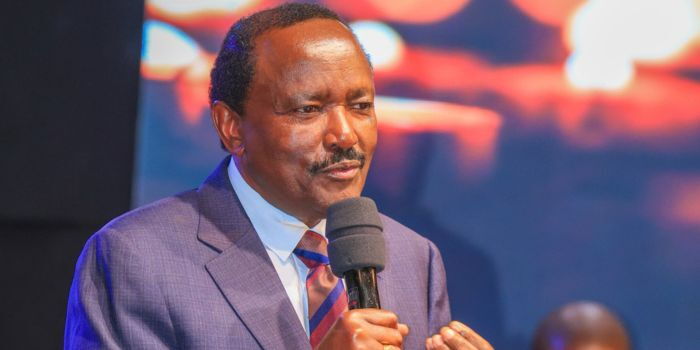Kalonzo Musyoka Reveals How Gen Z’s Discontent Contributed to Raila Odinga’s AUC Election Loss
Wiper Party leader Kalonzo Musyoka has broken his silence on the reasons behind Raila Odinga’s loss in the African Union Commission (AUC) Chairperson elections held on Saturday, shedding light on a number of factors that may have influenced the outcome.
Raila Odinga, despite being a frontrunner in the race, was unexpectedly defeated by Djibouti’s Foreign Minister Mahmoud Ali Youssouf, who won decisively with 33 votes. In the aftermath of Odinga’s loss, Kalonzo has pointed out that the situation in Kenya, particularly the country’s internal protests, played a crucial role in shaping the perceptions of voters across Africa, especially the younger generation.
Gen Z and the Impact of Protests on Raila’s Image
Kalonzo brought up a particularly sensitive issue – the protests that Raila Odinga led in Kenya. According to him, these protests, which led to clashes between demonstrators and security forces, tragically resulted in the deaths of many young people from Gen Z.
The Wiper Party leader believes that this had a lasting impact on how the international community viewed Kenya and its leadership, particularly among younger voters.
“When you lead protests that result in the deaths of young people in your own country, it sends a very negative message. The young generation, the very ones who should be supporting you, lost their lives during these protests,” Kalonzo stated. “People across Africa saw our country as one that abducts and kills its own young generation. They won’t stand with a leader who they believe is responsible for the suffering and deaths of the youth.”
The Disconnect with Gen Z’s Values
Kalonzo emphasized that Gen Z, both in Kenya and the wider African continent, values leadership that upholds human rights and protects the younger population from violence and injustice. The negative image created by the government’s handling of the protests led to a disconnect, with young voters choosing not to back Raila Odinga for the AUC Chair.
“Gen Z across Africa is looking for leaders who are compassionate and protect the rights of the youth. The loss of young lives during protests under Raila’s leadership made many believe that he does not prioritize the future of Africa’s youth. And that played a role in his loss,” Kalonzo added.
The Broader Impact on Raila’s Defeat
Kalonzo further linked Raila’s defeat to Kenya’s strained diplomatic relations with regional organizations, including the Southern African Development Community (SADC). He believes that SADC nations, who felt slighted by Kenya’s handling of regional conflicts like the DRC crisis, were less inclined to support Raila, especially in light of the broader negative image surrounding Kenya’s domestic issues.
“Raila’s loss wasn’t just about the election; it was about how the world views Kenya. The young generation, who are the future of Africa, are more informed, and they see the reality of what’s happening in Kenya,” Kalonzo remarked.
Diplomacy, Domestic Issues, and Raila’s Loss
Apart from the protest-related issues, Kalonzo also pointed out that Kenya’s strained relations with Southern African countries, particularly the SADC bloc, contributed to Raila’s failure in the race for AUC Chair. The SADC bloc, which initially supported Raila, shifted its support to Djibouti after the elimination of Madagascar’s candidate, Richard Randriamandrato, in the third round. Kalonzo explained that this shift was partly due to the diplomatic tensions sparked by President Ruto’s policies and his approach to the DRC conflict.
Raila’s Statesmanship and Ruto’s Congratulatory Message
Despite the defeat, Raila Odinga demonstrated statesmanship by graciously accepting the loss, while President Ruto extended his congratulations to the new AUC Chair, Mahmoud Ali Youssouf. However, the fallout from the elections and the factors that led to Raila’s loss are still subjects of ongoing debate in Kenya and beyond.
Kalonzo’s revelations shed new light on the complex factors behind Raila Odinga’s defeat, suggesting that both domestic and regional issues, including the tragic deaths of young protesters, may have played a significant role in shaping voters’ decisions across Africa.
Join Gen z and millennials TaskForce official 2025 WhatsApp Channel To Stay Updated On time the ongoing situation https://whatsapp.com/channel/0029VaWT5gSGufImU8R0DO30


